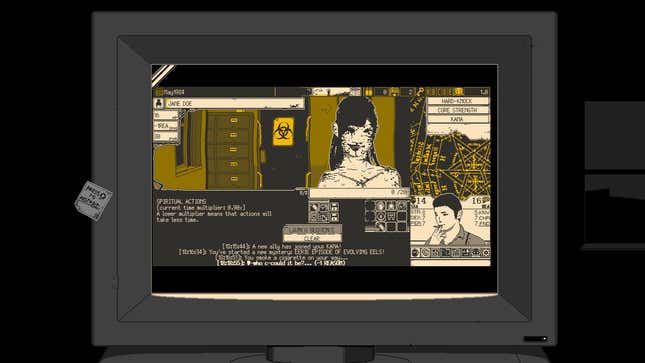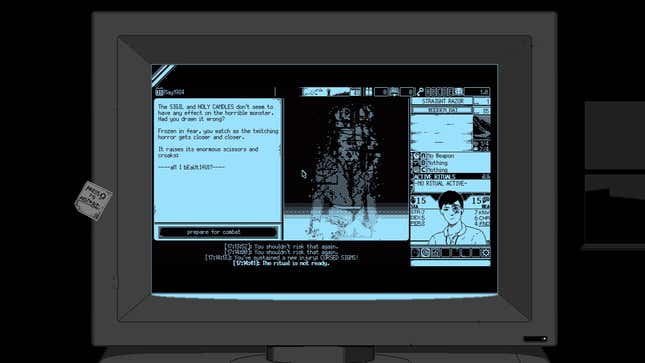I notice that people get kind of misty-eyed when they talk about the Junji Ito-inspired roguelite role-playing game World of Horror. If it were their cold husband, they’d have been wanting to hold it for a long time. It’s been out in some capacity, either as a demo or in early access, since 2017, but, finally, on October 19, Polish developer panstasz released its fully-grown 1.0 version to an itching crowd the way you might toss an animal a treat—it slips from your fingers, and it gets snapped up.
I usually scoff at that kind of hunger, but World of Horror deserves it. Though the game’s final form isn’t much different from its earlier iterations, there’s a polite superiority in its poetic horror storytelling, and it demonstrates the value in making people wait—the beauty in anticipation and, then, when you can’t take it anymore, the cosmic release.
Advertisement
In approaching World of Horror’s complete version, I feel like I’m creaking open a moth-eaten almanac, one stuffed with post-it note recipes and mysterious dates scribbled in and out with pencil. Like physical objects weathered by time, the game has been pressed into a very particular shape. Its 1-bit MS Paint job demonstrates this best. It glues a definite vibe across World of Horror’s gameplay, shamelessly and expertly mimicking Junji Ito’s uncanny ink drawings and distinctive visual take on terror.
Advertisement
I set a second aside to admire it. There are tons of color palettes to choose from, everything from cloudy seaweed green to more traditionally eerie clotted blood reds, and I experiment with adjusting the aspect ratio to either display the entire dumpy ‘80s PC it’s simulated on or full-screen the game to fit my actual computer.
Advertisement
When I’m satisfied with whole-screen, piss-yellow (there’s a time and place for it), I sift through young adults—the five playable characters I have unlocked are college-aged—and settle on Haru, 24, who’s addicted to cigarettes. “You’ve gained a new status,” the always-populating notifications at the bottom of my computer screen say. “[NICOTINE] WITHDRAWAL!”

Advertisement
Episodic horror, over and over again
That’ll be authentic for my custom playthrough, which lets me, among other things, choose my character’s stats and which Old God I want to destroy my life. The Extracurricular Activity mode is the game’s standard setting, and Quickplay acts as a playthrough randomizer, but neither of these guarantee me my God of choice—The Thing Forsaken By God, a gilded mirror with a blackened core. It makes it so going home, the place I can change Haru into a clean bomber jacket or take a bath to replenish stats, increases my doom, a percentage that triggers the God’s resurrection and ends a playthrough if I let it hit 100.
Advertisement
With that settled, I head out to solve five mysteries afflicting my degenerating town in Japan with the murky goal of unlocking a miserable lighthouse at the end of it. I want to call these mysteries World of Horror’s “episodic” elements, but the game clearly prefers them to be roguelike, making it so the items or status effects you accrue during one mystery impact your narrative in the next mystery you play in a set.
Unraveling one mystery takes me five-to-ten minutes, assuming I’ve survived its turn-based combat with a Jane Doe’s worm-eaten corpse, or a guy sprouting noodles out of his deflated skull like he’s a planter pot, or another one of the game’s many abominations. If the heavy “strong attacks” I spam (powerful spells unhelpfully drain my reason, one of my health stats, and I never have enough time in a typical encounter to figure out the secret combination of claps and bows I need to exorcize a ghost’s ass) can’t save me from death, my next playthrough of the same narrative is slightly different. I encounter a different scary lady who wants to kill me, I find objects in fresh cobwebbed corners, have the opportunity to buy new items or receive different perks, or attempt to unlock another one of the mystery’s multiple endings.
Advertisement
Read More: Old-School Adventure World Of Horror Is Like Stepping Into A Junji Ito Manga
These random encounters are the game’s most obviously sinister element, but they’re not what I quickly learn to like best. I’m more fascinated by the atmosphere it creates in subtleties. Its pixel-art style ascertains that gore is more suggested than shouted, and that is excitingly destabilizing, and World of Horror effectively wields narrative generalizations, too.
Advertisement

I catch myself nervously glancing at my ticking doom counter, which increases whenever time passes. Invisible “Town statuses” that slow-drip throughout a playthrough often isolate my character, giving me the chills. Contaminated Water turns my tap water into sludge, for example, taking my life-giving bath time away from me. Cut Off From The Outside World informs me that my town lost radio signal—it has no explicit gameplay consequences, but I realize I can’t call for help, and the thought brambles my mind.
Advertisement
Infinite anxiety, not content, please
Two hours into my approximately three-hour playtime, I feel a tension headache coming on. I’ve been enjoying the vibe, the vague savagery of World of Horror’s proud, oozing enemies and all their ominously enigmatic names—“Something Truly Evil,” “Scissor Woman,” “You?” It makes me think of the palm-sized, everyday ambiguities that jab at my paranoia while I float around my house—didn’t I leave the light on in here? Who moved my cell phone? Is this stomachache actually a WebMD case study?
Advertisement
But World of Horror sometimes feels too stuffed for me to settle into its potent, unconventional horror. I admire that, like an Ito comic, World of Horror has a sense of being apolitical. In the loaded horror genre that I love, it’s rare that something is scary simply because it is. In World of Horror, women are disgusting. Men are disgusting. Noodles are disgusting, because the world is dark and only getting darker, and the only pure thing is to accept it.
This quiet dread is sometimes prematurely swallowed by World of Horror’s many overwhelming elements—changing stories, reaching their multiple endings, acquiring the keys to unlock the dimming lighthouse, adding on perks to find items, or incantations, or mystic rituals that change with each playthrough, and…it’s a lot. Sometimes as I play, I find myself staring at plants in my room instead of at the screen, because they aren’t as noisy. I let Haru die and end my run prematurely.
Advertisement
I’d return to his dying town in Japan one day. There aren’t many horror games like this, games that don’t need rote, sometimes offensive tropes to scare you, games that are so well-oiled, they’re confident their horror will spread all over you just by touching them, like brushing against a wet spot and getting it all over your hand.
I’m impressed. Still, I think I’ll always want World of Horror to more widely embrace the minimalism it practices in moments so eloquently. I understand that ambient horror. I can live with it.






